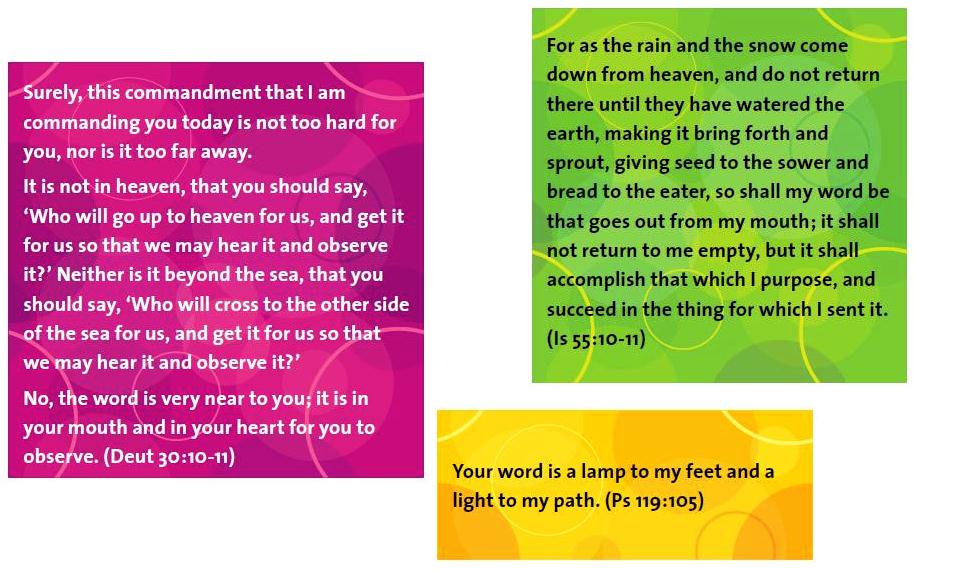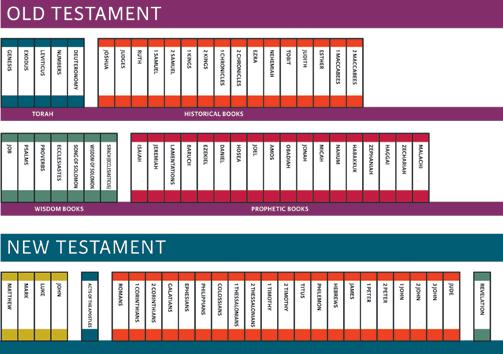Resources for Wednesday of Catholic Schools Week 2013 can be found on page 17-20 of the Resources Booklet and below you will find the resources adapted for use with data projectors.
Thought for the Day
Even in our technological era books are very much a feature of school life – whether they are e-books or printed pages we learn much from the wisdom that others share with us. Through books we come to understand new ideas, cultures and gain insights that can change our lives. In recent years especially since the Second Vatican Council the Bible is a book that is being rediscovered by many Catholics. We have come to understand that the Bible is a place where the human story and the story of God come together. Through its stories, prayers and reflections our lives are touched by the Holy Spirit who brings us to awareness that the Word of God is alive and active and is a force for good in our lives leading us leading us to a knowledge and love of Christ.
Word of God – We Encounter
Dei Verbum – Decree on Divine Revelation
Fifty years ago the biggest meeting to take place in the long history of the Catholic Church was taking place in Rome. It was called the Second Vatican Council. It wasn’t a short meeting either, in fact it lasted for three years and brought about important changes in the Church that very much influence the kind of Church we are today. The changes came about as a result of important documents that were prepared, debated and finally approved by the bishops attending the Council. One of the most important documents they produced was called Dei Verbum (The Word of God). This document sets out how Catholics are to understand the central place of the Bible or Sacred Scripture in their faith.
Let’s take a little time to think about what we believe about the Bible as Catholics.
Consider the following statements and answer true or false to each one:
| True | False | |
| The Catholic Church teaches that the Bible is literally true | ||
| A Catholic Bible only has the New Testament | ||
| The Catholic Church believes not only in Scripture but also in Tradition | ||
| The Old Testament is never read at Mass | ||
| Catholics believe God is present in his word as well as in the Eucharist |
If you have answered any of the above incorrectly take a little time to find out what the Catholic Church actually teaches on this particular point.
Introduction to the Bible PowerPoint
At the heart of a Catholic understanding of the Bible is the idea that through the word of God we can come to an encounter with God, we can experience God not as some distant figure from the past but as present to us now and giving us life. Let’s consider three passages from the Bible that speak about the word of God:
For You to Do:
Break into small groups and choose one of the texts. Read it slowly and pay attention to the images and ideas that are used. Discuss what you think the author is trying to say. Then in your groups write a short description of how the word of God might work in your life and become a source of hope, comfort and strength.
When you have finished share with each other the descriptions you have written.
The Lectionary
At Sunday Mass Catholics do not read from the Bible they read selected passages from the Bible that are contained in a book called the Lectionary. This book in its present form was compiled after the Second Vatican Council as a way of helping people come to a greater knowledge of the Bible and the different books it contains. The Sunday readings are given in a three year cycle A B C. There are four readings for Sunday Mass, one from the Old Testament, followed by a Psalm, then one from the Letters of the New Testament and finally one from the Gospels, telling a story from the life of Jesus.
Practice Five Steps to using the Bible for Prayer
Select a passage from Scripture, perhaps one of the readings from Sunday Mass and follow these steps:
- READ: What does the passage I have chosen say?
- MEDITATE: What does this passage say to me?
- PRAY: What do I say to God and what is God saying to me?
- CONTEMPLATE: I accept God’s invitation to sit quietly in his presence
- ACT: I want to live out God’s word in my everyday life







